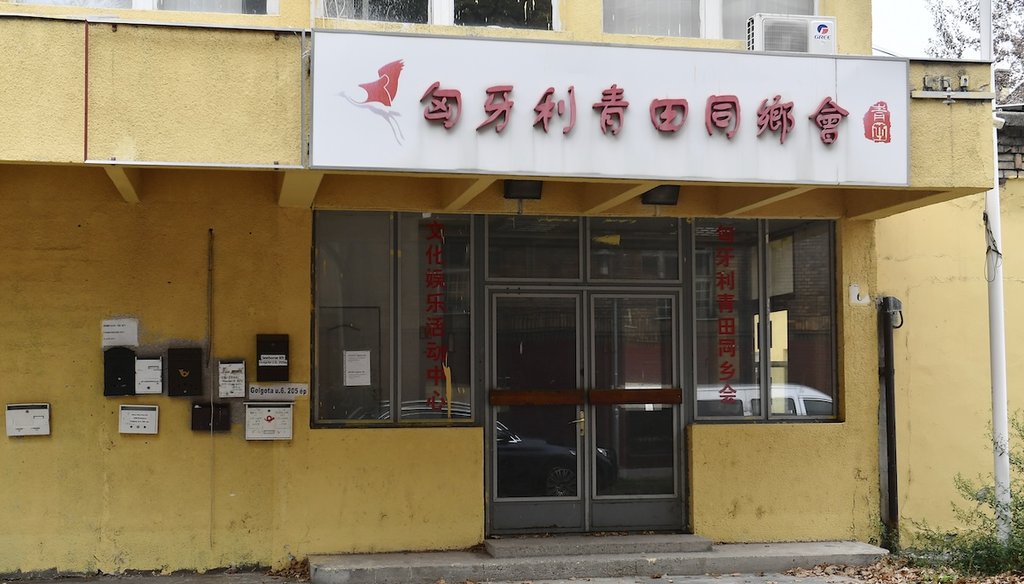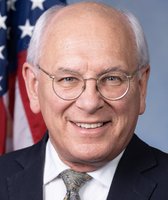Stand up for the facts!
Our only agenda is to publish the truth so you can be an informed participant in democracy.
We need your help.
I would like to contribute

An alleged Chinese overseas police station in Budapest, Hungary, on Oct. 27, 2022. (AP)
Is the Chinese Communist Party operating "sleeper cells" on American soil? That’s what Rep. Elise Stefanik, R-N.Y., said in a recent social media post.
Stefanik, who as House Republican Conference chair is the third-highest party official under Speaker Mike Johnson, R-La., decried Chinese nationals crossing the U.S.-Mexico border in a March 17 post on X.
Stefanik, who has closely aligned herself with former President Donald Trump, went on to say in the post that "we know the #CCP (the Chinese Communist Party) has set up sleeper cells in our communities. Joe Biden is asleep at the wheel as a hostile foreign regime is waging war on our way of life."
PolitiFact reached out to Stefanik — a member of the House Armed Services and Intelligence committees — multiple times but never received a response. However, terrorism experts said whether her assertion is accurate depends on how one defines "sleeper cell."
We couldn’t find any publicly available, official intelligence community definition of "sleeper cell," and we did not hear back from the CIA or the House Intelligence Committee. But the International Spy Museum, which has board members and advisers from the intelligence community, defines a "sleeper agent" as an "agent living as an ordinary citizen in a foreign country; acts only when a hostile situation develops."
This definition mirrors the image most Americans may have from pop culture: spies or terrorists who embed themselves in another country. These so-called sleeper agents pass themselves off as ordinary citizens as they await a call from their handlers — sometimes years later — with orders to undertake a mission such as sabotage or terrorism.
Experts told PolitiFact they are unaware of any efforts by China or its ruling Communist Party that fit this Hollywood version of a sleeper cell.
However, a looser definition of "sleeper cell" may fit a recent case of Chinese nationals who allegedly embedded themselves in Manhattan to operate an "illegal overseas police station," said Daveed Gartenstein-Ross, a terrorism expert who founded the security and technology firm Valens Global.
According to the Justice Department’s April 2023 announcement of the charges, the effort was focused on intimidating Chinese dissidents. Like sleeper agents, the suspects worked undercover within an American community while doing the bidding of a foreign government.
But the case also presents differences with the popular conception of sleeper cells. The suspects allegedly targeted Chinese dissidents living in America, not native-born Americans; their endgame does not appear to have been a terrorist act against the U.S.; and the suspects’ anti-dissident operations may have been ongoing, rather than having to await orders for a specific mission.
The overseas police station example
The existence of these overseas police stations had been bubbling up for a few years prior to the arrests.
In September 2022, a Spanish human rights group, Safeguard Defenders, released a report alleging the existence of at least 54 secret Chinese police stations in 21 countries. In April 2023, U.S. media reports cited seven Chinese police stations in the U.S.: two in New York City, two in California, one in Minnesota, one in Nebraska and one in Texas.
That month, the U.S. arrested "Harry" Lu Jianwang, 61, of the Bronx, and Chen Jinping, 59, of Manhattan, on charges related to operating a Chinese police station in lower Manhattan’s Chinatown neighborhood on behalf of a provincial branch of China’s Ministry of Public Security.
The suspects were charged with "conspiring to act as agents of the (People’s Republic of China’s) government as well as obstructing justice by destroying evidence of their communications with" a Ministry of Public Security official, the Justice Department said in announcing the arrests.
"They were residents of New York City, they communicated with the Chinese Ministry of Public Security, they worked to establish this unofficial police station, they operated it clandestinely at the behest of the People’s Republic of China, and it involved at least two people, which is the minimum for a ‘cell,’" said Gartenstein-Ross, the terrorism expert. "That provides a number of aspects that would establish them as a sleeper cell."
The Chinese "police stations" don’t fit other aspects of the popularly held definition
To the extent ordinary Americans have heard of sleeper cells, it’s from pop culture — and such examples differ from the Chinese police stations.
The Chinese defendants don’t appear to have been terrorists, unlike the sleeper cells from the 2005-2006 Showtime miniseries "Sleeper Cell" or another Showtime series, "Homeland."
In addition, the Chinese defendants appear to have been targeting Chinese dissidents, rather than natives of the country in which they embedded themselves. The latter was the modus operandi in the 1962 movie "The Manchurian Candidate" and the 2013-2018 FX series "The Americans."
It also appears that the two men arrested were pursuing their activities on an ongoing basis, rather than waiting for years to undertake a specific mission, which is a key element of the Spy Museum definition.
Would China want to pursue a sleeper cell strategy against the United States?
Experts told PolitiFact that a Chinese-devised sleeper cell of the Hollywood variety seems far-fetched in today’s environment. They said Stefanik’s framing falls into the longstanding trope of a feared Chinese invasion.
"Stefanik is basically replicating old-school ‘red scare’ stuff, trying to provoke anti-China sentiment," said James J.F. Forest, the director of security studies at the University of Massachusetts-Lowell.
However, they added, other tactics seem more promising from the Chinese perspective.
"A cyber-attack involving hackers that are already present and lurking in our networks is far more likely than a Chinese-directed terrorist campaign involving ‘sleeper cells,’" Forest said. "That’s not what China does, nor is it something they’d want or need to do."
Suzanne Ogden, a professor emerita of political science at Northwestern University, agreed.
Ogden said China has "so many thousands of students in scholars and others in this country that they don’t really need so-called sleeper cells. In the age of computers, they can find out everything they want to know without doing what sleeper cells used to do."
Our Sources
Elise Stefanik, post on X, March 17, 2024
Justice Department, "Two Arrested for Operating Illegal Overseas Police Station of the Chinese Government," April 17, 2023
Merriam-Webster, definition of "sleeper cell," accessed April 24, 2024
Catholic University of America Center for Human Rights, "Chinese ‘Police Stations’ in the United States – Designing an Effective Response," May 18, 2023
Newsweek, "Full List of China's Unofficial Police Stations Around the World," Dec. 5, 2022
New York Post, "After FBI busts Chinese ‘police station’ in NYC, six more exposed in US," April 18, 2023
IMDB: Sleeper Cell, Homeland, The Manchurian Candidate, The Americans, accessed April 24, 2024
Email interview with Suzanne Ogden, emerita professor of political science at Northwestern University, March 26, 2024
Email interview with James J.F. Forest, director of security studies at the University of Massachusetts-Lowell, April 15, 2024
Interview with Daveed Gartenstein-Ross, founder and CEO of Valens Global, April 17, 2024


































